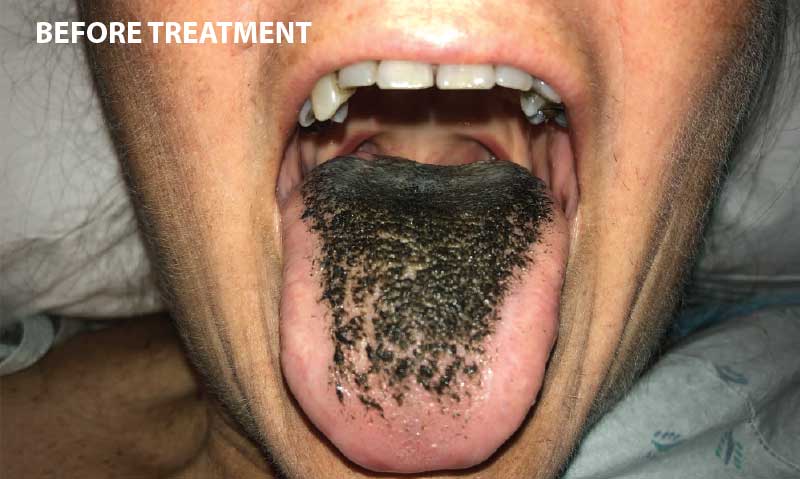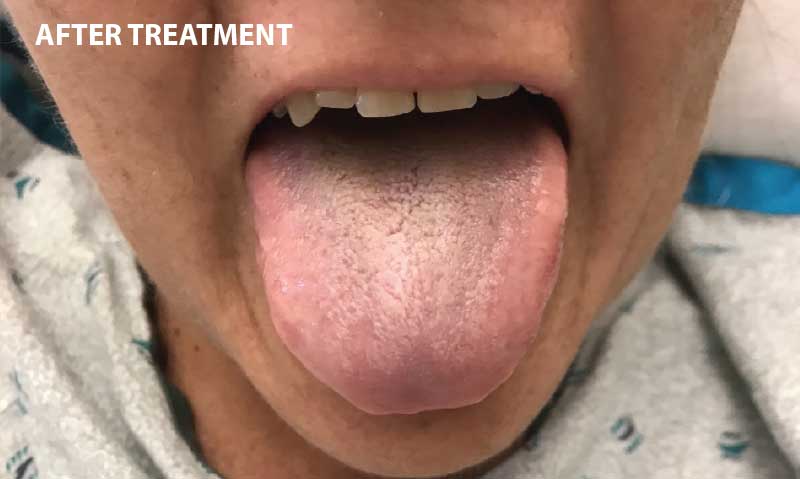Black Hairy Tongue
An occasional side effect of antibiotics
Dear Doctor,
I saw on the news that a woman taking antibiotics got a black hairy tongue, and it looks awful! Am I going to get this if I take antibiotics?
Dear Melissa,
I can understand your concern; the condition known as "black hairy tongue" may look scary. But let me assure you that this is not a common side effect of taking antibiotics and it is easy to treat when it does occur. I can also explain a bit more about the case you saw in the news because I was involved in treating the woman you read about.
| Photos provided by The New England Journal of Medicine ©2018 |
 |
| Brushing the tongue surface and sometimes changing medication to a different antibiotic can clear up the condition in a few weeks. |
 |
| Black hairy tongue is the overgrowth of tiny bumps on the tongue surface called filiform papillae, which assist in gripping food for chewing. Food debris and bacteria can get caught in the elongated papillae, causing a discoloration that may be yellow, greenish, brown or even black. |
"Black hairy tongue" is kind of a misnomer for this condition because the tongue does not always appear black and what you are seeing in that picture is not hair. It's actually an overgrowth of tiny bumps on the tongue called filiform papillae that assist in gripping food for chewing. These papillae are usually about 1 millimeter in length, though they are constantly growing.
In the normal course of eating and daily oral hygiene, the filiform papillae tend to get scraped down and replenished by the body. But when something disrupts the balance between their growth and removal, the little bumps can elongate to as much as 18 millimeters and form what looks like a hairy mat on the back of the tongue. Food debris and bacteria then get caught in the elongated papillae, causing a discoloration that may be yellow, greenish, brown or even black.
Antibiotics can sometimes cause this disruption, though it is not clear exactly how. It probably has to do with the way this type of medication changes the balance of helpful and harmful bacteria that normally live in the mouth, perhaps encouraging the growth of more harmful bacteria. We see it most often with antibiotics in the tetracycline family, including minocycline, the medication my patient was taking to cure an infection of her accident-related wounds sustained in a car accident.
Other factors that may cause black hairy tongue include poor oral hygiene and smoking. Estimates of the prevalence of this condition vary widely: I have seen studies that have found as little as 0.6% to as much as 11% of the population experiencing some form of this problem at any given time.
Fortunately, black hairy tongue is not harmful to your health despite its unpleasant appearance. And it's generally easy to remedy—usually by removing the cause of the problem and giving some extra attention to oral hygiene. In the case of my patient, changing her medication to a different antibiotic along with gentle brushing of the tongue cleared up the condition in a few weeks.
The best way to prevent black hairy tongue is to avoid smoking and stick to a good oral hygiene routine that includes brushing your teeth, flossing between them, and brushing your tongue. You can also use an inexpensive oral hygiene aid sold in most drug stores called a tongue scraper for cleaning your tongue.
However, I would not recommend avoiding antibiotic treatment if that's what your doctor has prescribed. An uncured infection can be a lot more dangerous to your health than a discolored tongue. Besides, in the unlikely event antibiotic treatment does affect the appearance of your tongue, your doctor should be able to put you on a different medication. Black hairy tongue may look alarming—but it's preventable, treatable and benign.




